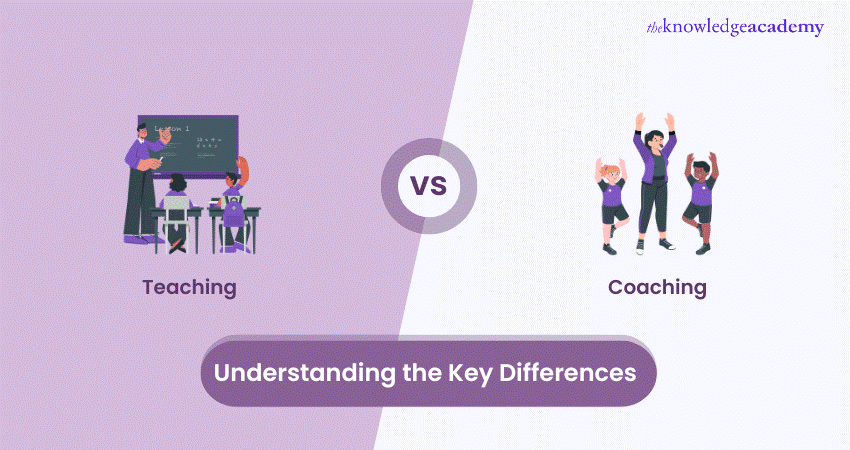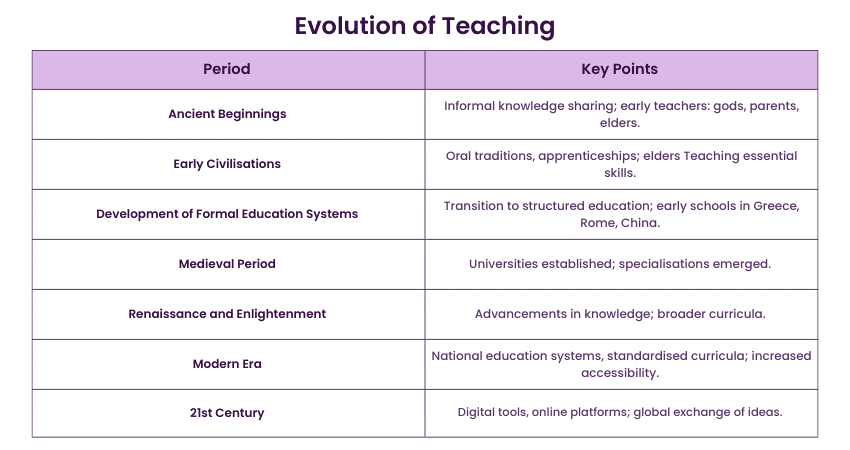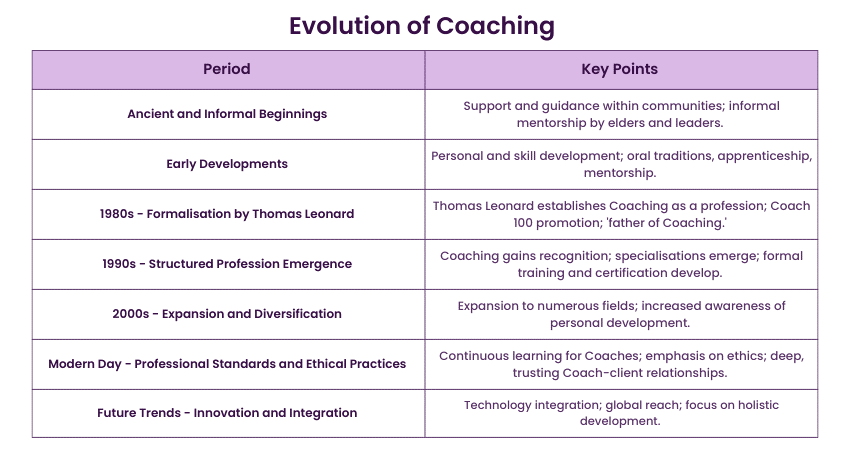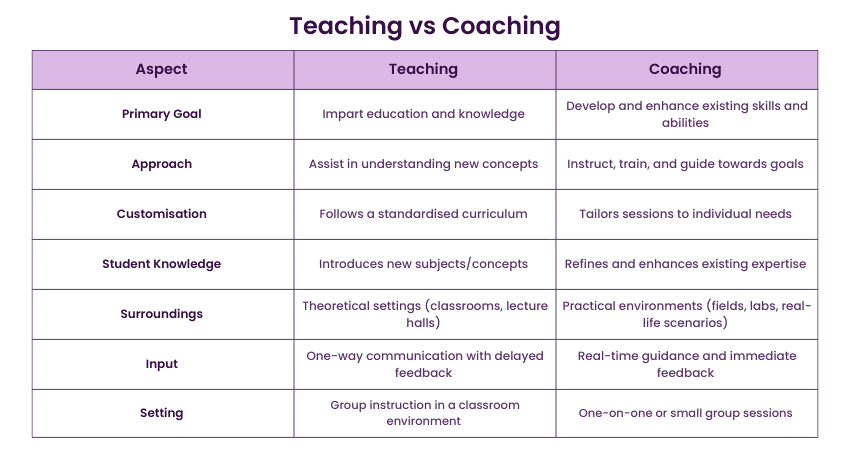We may not have the course you’re looking for. If you enquire or give us a call on +44 1344 203 999 and speak to our training experts, we may still be able to help with your training requirements.
Training Outcomes Within Your Budget!
We ensure quality, budget-alignment, and timely delivery by our expert instructors.

When it comes to shaping minds and fostering growth, both Teaching and Coaching play crucial roles. But what sets them apart? Buckle up as we explore their unique flavours! Imagine a classroom bathed in sunlight, textbooks stacked neatly, and an enthusiastic Teacher at the front. That’s the quintessential Teaching scene. Now, shift gears. Picture a cosy corner, perhaps with a cup of chamomile tea. There sits a Coach, notepad in hand, ready to unravel mysteries.
In this blog, we delve into the fascinating world of Teaching vs Coaching. On one side, we have the knowledgeable Teacher, the subject matter expert who imparts wisdom. And on the other side, we meet the Coach—the catalyst for change, guiding students toward growth, whether it’s through life advice, education, or skill development. So, get ready as we explore these two dynamic roles.
Table of Contents
1) What is Teaching?
2) What is Coaching
3) Teaching vs Coaching: What’s the Difference?
a) Primary Goal
b) Approach
c) Customisation
d) Student knowledge
e) Surroundings
f) Input
g) Setting
4) Conclusion
What is Teaching?
Teaching as a profession is primarily focused on imparting knowledge to students. It involves the structured delivery of information, aiming to facilitate learning and intellectual growth. Teaching is often perceived as a one-way transfer of knowledge, with the Teacher providing information and the student receiving it.
Evolution of Teaching

1) Ancient Beginnings
a) Origin: Teaching as a concept has existed for thousands of years.
b) Role: Informal knowledge sharing within families and communities.
c) Early Teachers: Often considered to be gods, parents, or elder community members according to ancient scriptures.
2) Early Civilisations
a) Focus: Oral traditions and apprenticeships.
b) Method: Knowledge passed down through generations, ensuring cultural and practical continuity.
c) Example: Elders Teaching younger members essential skills and cultural practices.
3) Development of Formal Education Systems
a) Transition: From informal to more structured forms of education.
b) Formalisation: The role of the Teacher became more defined and institutionalised.
c) Example: Establishment of early schools and academies in ancient civilisations like Greece, Rome, and China.
4) Medieval Period
a) Growth: Establishment of universities and formal education institutions.
b) Specialisation: Emergence of different fields of study and specialisations.
c) Example: The founding of medieval universities in Europe, focusing on liberal arts, theology, and sciences.
5) Renaissance and Enlightenment
a) Innovation: Advancements in scientific and humanistic knowledge.
b) Expansion: Broadening of curricula and educational methodologies.
c) Example: The influence of scholars and educators like Erasmus, Galileo, and Newton on education.
6) Modern Era
a) Systematisation: Development of national education systems and standardised curricula.
b) Accessibility: Increasing access to education for broader segments of the population.
c) Example: Compulsory education laws and the establishment of public schooling systems.
7) 21st Century
a) Technological Integration: Use of digital tools and online platforms in education.
b) Globalisation: Exchange of educational practices and ideas across cultures.
c) Focus: Emphasis on critical thinking, creativity, and lifelong learning.
d) Examples: E-learning, MOOCs, and international educational collaborations.
What is Coaching?
Coaching is highly student-centric, focusing on the holistic development of individuals through continuous and personalised guidance. It aims to help students grow not just academically but also as well-rounded individuals, aiding them in refining their skills and discovering their purpose and direction in life.
While Coaching may appear similar to Teaching, the fundamental difference lies in the Coach's deep commitment to the student's overall growth. A significant aspect of Coaching is uncovering and nurturing hidden talents within the student that they may not have realised.
Evolution of Coaching

1) Ancient and Informal Beginnings
a) Origin: Support and guidance provided within communities.
b) Role: Informal mentorship by elders and community leadership.
2) Early Developments
a) Focus: Personal and skill development within various cultures.
b) Method: Oral traditions, apprenticeship, and mentorship.
3) 1980s - Formalisation by Thomas Leonard
a) Key Figure: Thomas Leonard, a financial planner in the United States.
b) Contributions:
Establishment of Coaching as a formal profession.
Creation of the Coach 100 promotion to acquire clients and professionalise Coaching.
Recognised as the "father of Coaching."
4) 1990s - Structured Profession Emergence
a) Growth: Coaching gains recognition as a structured profession.
b) Specialisations: Emergence of various methodologies and specialised fields such as life Coaching, executive Coaching, and sports Coaching.
c) Focus: Development of formal training programs and certification.
5) 2000s - Expansion and Diversification
a) Fields: Coaching expands to numerous fields tailored to specific individual needs and goals.
b) Recognition: Increasing awareness of the importance of personal development and the role of Coaches.
6) Modern Day - Professional Standards and Ethical Practices
a) Learning: Emphasis on continuous learning and professional development for Coaches.
b) Ethics: Importance of maintaining ethical practices within the profession.
c) Relationship: Development of deep, trusting relationships between Coach and client.
7) Future Trends - Innovation and Integration
a) Technology: Integration of technology in Coaching practices (e.g., virtual Coaching sessions).
b) Global Reach: Expanding the reach of Coaching to a global audience.
c) Holistic Approach: Increased focus on holistic development, combining various Coaching methodologies.
Learn effective training techniques with our Train the Trainer Course – Join today!
Teaching vs Coaching: What’s the Difference?
Although both Teaching and Coaching aim to impart knowledge and foster development, there are distinct differences that set them apart. Let's explore these differences:

Primary Goal
The primary goal of a Teacher is to impart education and knowledge to students. In contrast, Coaching focuses on helping individuals develop and enhance their existing skills and abilities.
Approach
Teaching involves assisting students in understanding new knowledge and related concepts. Coaching, on the other hand, is more centred on instructing, training, and guiding individuals to achieve their personal and professional goals.
Customisation
Teaching often follows a standardised curriculum, making it challenging to customise lessons for each student. Coaches, however, typically work with smaller groups or individuals, allowing them to tailor their Coaching sessions to meet the needs and strengths of each person.
Discover Your Teaching Style: Find the Perfect Type of Teacher for You!
Student Knowledge
Teaching often follows a standardised curriculum, making it challenging to customise lessons for each student. Coaches, however, typically work with smaller groups or individuals, allowing them to tailor their Coaching sessions to meet the needs and strengths of each person.
Surroundings
Teaching predominantly occurs in theoretical settings such as classrooms, auditoriums, or lecture halls. Conversely, Coaching often takes place in practical environments like field arenas, laboratories, or real-life scenarios where immediate application of skills is possible.
Input
Teaching is generally characterised by one-way effective communication, with feedback provided later, usually after assessments or examinations. Coaching, however, involves real-time guidance and feedback, allowing for immediate correction, improvement, and rework during practical situations.
Setting
The settings for Teaching and Coaching differ significantly. Teaching typically involves monitoring a group of students together in a classroom or similar environment. Coaching can occur in various settings, including one-on-one sessions, small group workshops, or even virtual environments, providing more flexibility and personalised attention.
Learn about the significance of effective Coaching with our Coaching Skills Training- Join now!
Conclusion
The debate of Teaching vs Coaching is simply for understanding the difference in their roles. Both are valuable depending on the context. Teaching focuses on imparting knowledge and skills systematically, while Coaching emphasises guiding individuals to enhance their performance and achieve specific goals. Understanding these roles helps tailor their application to suit different circumstances effectively.
Understand the importance of goal setting with our Coaching and Mentoring Training – Join today!
Frequently Asked Questions

The four different types of Coaching are Mindful Coaching, Holistic Coaching, Democratic Coaching and Autocratic Coaching.

A good Coach embodies many good traits. However, the 3 Cs of exceptional Coaching are – courage, compassion, and curiosity.

The Knowledge Academy takes global learning to new heights, offering over 30,000 online courses across 490+ locations in 220 countries. This expansive reach ensures accessibility and convenience for learners worldwide.
Alongside our diverse Online Course Catalogue, encompassing 17 major categories, we go the extra mile by providing a plethora of free educational Online Resources like News updates, Blogs, videos, webinars, and interview questions. Tailoring learning experiences further, professionals can maximise value with customisable Course Bundles of TKA.

The Knowledge Academy’s Knowledge Pass, a prepaid voucher, adds another layer of flexibility, allowing course bookings over a 12-month period. Join us on a journey where education knows no bounds.

The Knowledge Academy offers various Train the Trainer Courses, including Coaching and Mentoring Course, Coaching Skills Training, and Mentoring Training. These courses cater to different knowledge levels, providing comprehensive insights into Top 15 Mentoring Skills.
Our Business Skills Blogs cover a range of topics related to Coaching, offering valuable resources, best practices, and industry insights. Whether you are a beginner or looking to advance your Coaching skills, The Knowledge Academy's diverse courses and informative blogs have you covered.
Upcoming Business Skills Resources Batches & Dates
Date
 Coaching Skills Training
Coaching Skills Training
Fri 17th Jan 2025
Fri 7th Mar 2025
Fri 23rd May 2025
Fri 18th Jul 2025
Fri 12th Sep 2025
Fri 14th Nov 2025
Fri 12th Dec 2025







 Top Rated Course
Top Rated Course



 If you wish to make any changes to your course, please
If you wish to make any changes to your course, please


